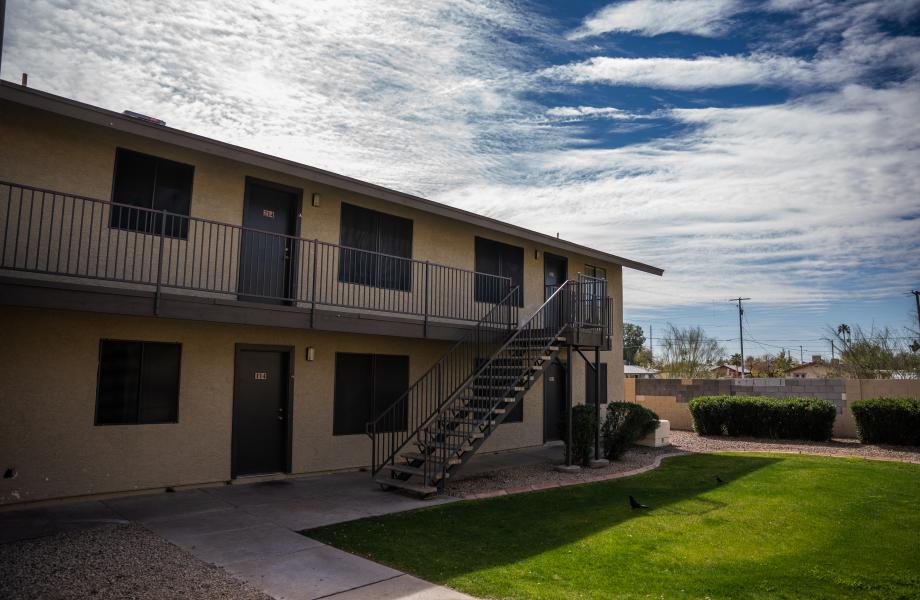Let's talk: Evictions in Arizona
The numbers are in: Evictions in Maricopa County are at the highest levels since before the Great Recession with just under 8,000 evictions in October 2023 alone, and there's projected to be more than 80,000 over the course of 2024. These numbers have been rising since the pandemic and the end of the eviction moratorium, and they are concerning, especially since they coincide with the rising rates of homelessness throughout the Valley.
So the natural question emerges: What is causing so many evictions? That's what SVdP wanted to find out, so we sat down with Maxine Becker, a former attorney advocate for Wildfire AZ, to get down to the root of the problem.
What is driving the uptick in evictions throughout Arizona?
Maxine Becker: We went through a period during the Great Recession 2008/2009, where the building that we were doing dropped dramatically. But then, coming out of that, we were facing more people moving to the Valley. So it created a significant housing crunch. Then you have the basic economic factor of supply and demand.
So it's almost impossible to find market rate housing that's less than $1,000. And most of the housing that's been built has been on more of a luxury end. So the folks that are getting squeezed the hardest during this housing shortage, because of the low availability and rising prices, are people who have low incomes.
What does the process of being evicted look like?
In every lease, you have a date when your rent is due, and if you are late paying that rent, within the next day or so, you'll get a notice from your landlord — that's considered a five day notice. So after five days, if you don't pay your rent, the landlord then can start the eviction process.
The landlord will file a complaint, the complaint comes back with a summons and a court date. You've got to be in court within a week. And the playing field that the tenants are in is that landlords are represented over 97-98% of the time, there's a lawyer on the other side, and in almost 97-99% of cases, the tenants have no legal representation. They have nobody to talk to them about what's going to happen.
So unless you have a defense where you say, "I'm going to pay my rent," or, "I have paid my rent," the judge will sign a judgment against you that day. And then there's a five day waiting period before the landlord can come back to court and ask the constable to file what's called a writ of restitution. And that restitution triggers the constable to put your name on the list and go to your home and perform a lockout.
The constable comes, he or she knocks on your door, introduces themselves, and they stand there while you collect your basic necessities, your clothes, your medicine, your documents, and he or she will not give you hours, it's usually 20-30 minutes. Then you have to leave the property and they put a lock on the door and you can't re-enter the premises then. And you've lost possession of the property.
That is an absolutely traumatic experience. It's terribly traumatic for children. If you have health issues, if you're having disability issues, it's a true emergency. So we really want to make sure that we can do everything to avoid that from happening.
So I would say from the time that you could be late on your rent to the time that you could get a knock on the door, it's generally about a total of about 25-27 days. From being late on your rent to being without a home.
It's mostly women. It's women of color. And it's single women of color with children who are impacted the most. And then you also have many people who are elderly, on fixed incomes or who are disabled. That is a huge part of the face of eviction
How difficult is it to get housing after an eviction is on a person's record?
It's very difficult. Landlords don't want that. They see that as a huge risk factor. So that's very devastating for folks. When you're in that position, it's a long road back.
Kids get pulled out of school and oftentimes you're working when you're going through this. You have a job, but the displacement and the urgency of finding a new place, having to go to court, having to move or go live somewhere else or live in your car: oftentimes it results in you losing your job.
So I like to say that our eviction system works really well. It's built to evict people, and it does it very well.
What can someone do if they are faced with the possibility of an eviction?
One thing that I think is that sometimes is very hard for tenants to do — but landlords often say that this would be very helpful — is if you are going to be late, go talk to your landlord. It's a really hard conversation to have, but if you've been a good tenant, if you paid on time, if you're a good neighbor, say, "Look, I want you to know that this happened to me, I'm not going to be able to pay but here's my plan. Can you work with me?"
That conversation can really be the difference between an eviction and not an eviction. Oftentimes, landlords will say that the folks that they don't hear from, "We're going to start filing those eviction notices quickly."
So I would just say communicating is hard. But it can be the difference between housing and not housing.


